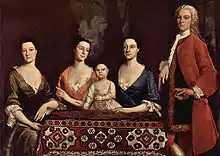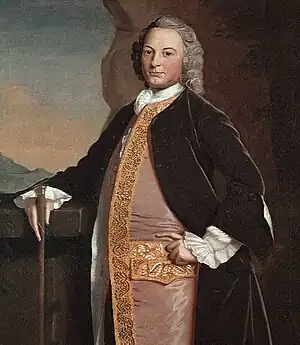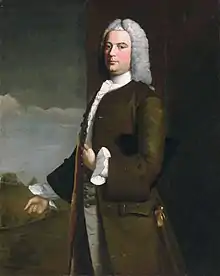
Robert Feke (c. 1705 – c. 1752) was an American portrait painter born in Oyster Bay, New York. According to art historian Richard Saunders, "Feke’s impact on the development of Colonial painting was substantial, and his pictures set a new standard by which the work of the next generation of aspiring Colonial artists was judged."[1] In total, about 60 paintings by Feke survive, twelve of which are signed and dated.[1]
Life and career
One of Robert Feke's grandmothers was Elizabeth Fones.[2]
Little is known for certain about his life, particularly his early years. Only one work by Feke, a portrait of a child, is datable before 1741.[1] In that year he moved to Boston, where he painted Isaac Royall and Family (1741), a group portrait which borrows its composition from John Smybert’s The Bermuda Group (1729).[1] Feke's works also show the influence of John Wollaston.
From 1741 until 1750, Feke worked in Boston, Newport, Rhode Island, and Philadelphia, painting wealthy merchants and landowners.[3] The latest record of his activities is August 26, 1751;[1] suggestions by Feke's early biographers that he died in Barbados or Bermuda have not been substantiated.[1]
Feke's paintings are known for their sobriety and uniformity, but also for their rich colours and painterly boldness.
Works
- Benjamin Franklin, Portrait (c. 1746) at the Fogg Museum, Harvard University Portrait Collection
- Charles Apthorp, Portrait 1748, oil on canvas, Cleveland Museum of Art American
- Grizzell Eastwick Apthorp, Portrait (Mrs. Charles Apthorp) (1748) at the Fine Arts Museums of San Francisco
- Mrs. John Banister, 1748, oil on canvas, The Detroit Institute of Arts
- William Bowdoin
- John Channing, c. 1747–49, oil on canvas 127 x 102, Museum of Fine Arts, Boston
- Mary Channing (Mrs. John Channing), c. 1747–49, oil on canvas 127 x 102, Museum of Fine Arts, Boston
- Tench Francis, Sr., Portrait at the Metropolitan Museum of Art
- Captain Alexander Graydon, c. 1746, oil on canvas, National Gallery of Art American Museum of Fine Arts
- Thomas Hopkinson, Portrait at the Smithsonian Institution
- Ralph Inman
- Isaac Royall and Family, Portrait, 1741, Historical & Special Collections, Harvard Law School Library
- Edward Shippen, Portrait of Chief Justice, at the Philadelphia Museum of Art
- Isaac Winslow, c. 1748, Oil on canvas 127 x 102, Museum of Fine Arts, Boston
Gallery
 Isaac Royall and Family (1741), Harvard Law School
Isaac Royall and Family (1741), Harvard Law School Portrait of William Bowdoin (1748)
Portrait of William Bowdoin (1748) Mrs. Charles Willing (1746), Winterthur Museum, Garden and Library
Mrs. Charles Willing (1746), Winterthur Museum, Garden and Library Portrait of a Woman (c. 1748), Brooklyn Museum
Portrait of a Woman (c. 1748), Brooklyn Museum Susannah Boutineau (1748)
Susannah Boutineau (1748)_-_2004.219_-_Fogg_Museum.jpg.webp) Ralph Inman (1748)
Ralph Inman (1748)

Notes
- Biography at infoplease.com
- Wilson, J. G.; Fiske, J., eds. (1900). . Appletons' Cyclopædia of American Biography. New York: D. Appleton.
- Myron, Robert, and Abner Sundell. (1969). Art in America from colonial days through the nineteenth century. London: Crowell-Collier Press.
- National Museum of American Art (U.S.), & Kloss, W. (1985). Treasures from the National Museum of American Art. Washington: National Museum of American Art. ISBN 0874745950
References
External links
- John Singleton Copley in America, a full text exhibition catalog from The Metropolitan Museum of Art, which contains material on Robert Feke (see index)